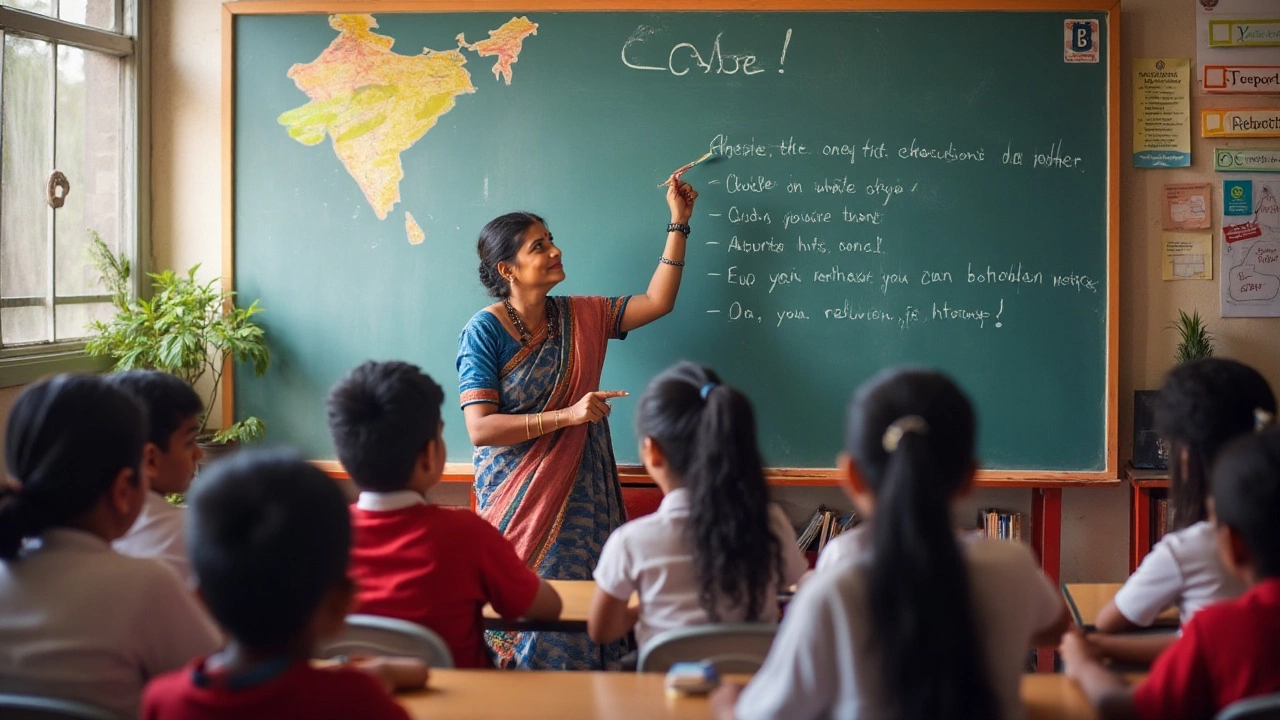When discussing Indian education, it's not uncommon to stumble upon the term CBSE. It's often thrown into conversations as if it's synonymous with Delhi itself. But why is that so? How did CBSE, a national board, gain such a close association with India's capital?
In this piece, we'll peel back the layers on CBSE's origins and how it functions today. The Central Board of Secondary Education, now spread across the nation, acts as a vital educational governing body in India. We'll unravel its widespread foothold, the breadth of its curriculum, and the unique stamp it has left on Indian education – from the bustling streets of Delhi to the remote corners of the country.
Join me in exploring whether this prestigious educational framework is indeed just a 'Delhi board' or, as I believe, something much more profound in its national identity.
- Introduction to CBSE and its Origins
- Understanding the Misconception: CBSE as Delhi Board
- The National Reach of CBSE
- CBSE Curriculum and Examination Details
- Delhi's Historical Influence on CBSE
- Conclusion: Clarifying the CBSE Identity
Introduction to CBSE and its Origins
The Central Board of Secondary Education, or CBSE, is a cornerstone in the Indian education system, impacting millions of students annually. Established in 1929, CBSE was born out of a necessity to streamline and standardize educational practices across regions. Pre-independence India had fragmented educational policies that varied greatly from one province to another. The British government realized the need for a unified board to supervise and manage the functioning of key public and private schools across the nation. The Delhi Board's emergence as a major educational authority is hence deeply rooted in administrative consolidation efforts by the colonial government.
One of the most notable attributes of CBSE is its adaptability and expansive reach, from its initial foothold in Delhi to becoming a nationwide educational authority. CBSE today governs thousands of schools across India, with an increasing number of international schools joining its ranks. As a part of its mission statement, the board strives not only to educate but also to innovate. It sets a cohesive curriculum that aims to prepare students for diverse challenges in global environments. The emphasis is placed on holistic education, perhaps why it continues to gain prestige and attract educational institutions worldwide.
"CBSE’s curriculum is one of the most dynamic and flexible educational frameworks found globally," explains Dr. Sunita Sharma, an education consultant, during a recent interview with Educational Times. "It combines rigorous academic standards with co-curricular activities, aiming to nurture both mind and soul."
The CBSE board has continuously worked to evolve with technological advancements. From traditional methods to digital learning platforms, it has adopted and encouraged technology-driven education, ensuring that schools align with international educational standards. The emphasis on inclusion and adaptability is evidenced by its unique provisions for differently-abled students, setting it apart from many global counterparts. There's an inherent belief that an education system should cater to all, providing individualized attention while maintaining the collective growth of society.
A significant shift occurred in the 1960s when the board underwent restructuring to meet the demands of a burgeoning and diversifying nation. Alongside its expansion came multiple reforms aimed at enhancing educational practices. For instance, the introduction of vocational streams was a response to provide students with practical skills necessary in a skills-oriented society. Such initiatives showcase CBSE’s vision and foresight, allowing students to pursue interests beyond traditional academic confines.
With its deep historical roots, the CBSE has not only survived but thrived by continuously reinventing itself over almost a century. It emphasizes inclusive policies and student-centric reforms, resulting in accolades from educational practitioners and scholars. It's this blend of tradition and innovation that defines the CBSE board today – a cemented legacy in India's educational framework, with an ever-growing impact on future generations.
Understanding the Misconception: CBSE as Delhi Board
It’s easy to see why some might mistakenly label the CBSE as the 'Delhi board'. After all, its headquarters is nestled in Delhi's historical tapestry, a city with a rich backdrop and dynamic pace. However, equating the CBSE’s presence to merely a Delhi-centric entity masks the broad-based nature of this educational giant. Founded in 1962, the Central Board of Secondary Education was conceived to harmonize educational standards across India, aiming to transcend regional boundaries and foster a unified scholastic framework.
Delhi's historical engagement with the education sector, coupled with the presence of the national government, naturally lends it an influential role in the fabric of the CBSE. But it's important not to overlook CBSE’s mission: to represent the educational aspirations of an entire nation, not just one city. The board administers exams and endorses curriculums from the snowy landscapes of Himachal Pradesh to the coastal expanses of Kerala, reaching over 27,000 affiliated schools in India and abroad.
The Times of India once noted, "CBSE's DNA is deeply rooted in an all-India character, which embraces diversity and innovation in education."
The close ties with Delhi often emerge from its decision-making hub and central administrative operations based there. Yet, the broader question remains: Does having headquarters in Delhi make it regionally exclusive? A glance at its systemic functions across states reveals that teaching methodologies, syllabi, and curriculums reflect the diverse educational needs of students nationwide. In essence, its Delhi origins have more to do with logistical accessibility and historical precedence rather than educational purview confined by geography.
Take, for instance, the focus on languages. CBSE offers a wide palette, reflecting the linguistic diversity of India, from Hindi and English to Tamil and Bengali. It’s a proactive reminder that CBSE caters to the Indian demography's varied cultural spectrum. Moreover, the board regularly revisits its curriculum, with inputs from educators and policymakers from different regions, embodying a truly democratic approach towards education.
A table highlighting the geographical spread of CBSE could demonstrate a richer narrative:
| Region | Number of Schools |
|---|---|
| North India | 9,000+ |
| South India | 6,000+ |
| East India | 5,000+ |
| West India | 5,000+ |
This portrayal is more than statistics; it's testament to CBSE's reach and flexibility in accommodating the regional educational ethos. Its association with Delhi is, perhaps, an oversimplification that history and logistical expediency have nurtured. However, its core commitment remains resolutely national, aiming to enrich and equip students with education that is inclusive and expansive. Understanding this clears the fog around the 'Delhi board' myth, spotlighting a narrative of adaptability and intricate planning rather than one of geographic insularity.

The National Reach of CBSE
The CBSE, or Central Board of Secondary Education, is often a topic of conversation among parents, students, and educators across India. One of its most remarkable aspects is its extensive reach throughout the country. Spanning from the arid deserts of Rajasthan to the lush greens of Kerala, CBSE has established itself as a nationwide educational framework. This expansion wasn't achieved overnight; it is a result of years of planned strategies and keen attention to maintaining educational standards that cater to a diverse Indian populace. By offering a standardized curriculum, CBSE ensures that students from different linguistic, cultural, or geographical backgrounds receive a consistent level of education, preparing them for higher studies anywhere in India or even abroad.
Tracing back to its roots, CBSE was set up in 1962 but has since grown to include over 21,000 schools in India and around 220 schools in 28 foreign countries. These figures are not just digits on paper; they represent the aspirations and dreams of a multitude of students who depend on CBSE’s structured syllabus. The board's curriculum is designed to be robust yet adaptable, enabling students to thrive in various educational environments. As of its latest reports, the board's affiliation has been sought not just by public schools but also by an increasing number of private institutions which strengthens its foothold across the educational landscape.
Notably, the Delhi board misconception stems from the CBSE administrative headquarters being located in Delhi. Despite this, the board operates independently of regional biases, focusing instead on providing universal academic standards. This philosophy of providing uniform education has been echoed by Dr. S.C. Sharma, a noted educationist, who once mentioned, "CBSE's commitment to delivering education that's both qualitative and inclusive reflects in its ability to reach every Indian household, breaking barriers of state boundaries."
The board's administration regularly updates syllabi to incorporate innovative educational practices, maintaining a competitive edge in a rapidly-changing global educational arena.
Given its international arm, CBSE also appeals to the Indian diaspora facilitating cultural and educational continuance for Indian families residing abroad. Each year, the board facilitates entrance exams like the Joint Entrance Examination (JEE) for engineering aspirants and NEET for medical hopefuls, underscoring its pivotal role in nurturing the country's future professionals. Even the board's assessment patterns are renowned for their rigor and inclusivity, allowing students to develop critical thinking and application-based learning techniques. Encompassing such a wide demographic, CBSE molds students into individuals capable of facing global challenges with a uniquely Indian perspective, reinforcing both national and global identities.
CBSE Curriculum and Examination Details
The CBSE curriculum is a meticulously crafted educational framework that serves as the backbone for secondary and higher secondary education across India. It integrates a balance of academic excellence and holistic development, ensuring that students not only ace exams but also cultivate a broad set of skills applicable in various domains. Characterized by a focus on core subjects such as Mathematics, Science, and English, it also introduces students to an expansive range of co-curricular activities. This combination fosters a keen understanding of both theoretical knowledge and practical skill sets, offering a comprehensive educational experience. Each subject is crafted to encourage analytical thinking, problem-solving abilities, and creativity, elements that are increasingly appreciated in today's competitive world.
A defining aspect of the CBSE examination process is its standardized evaluation, which aims to maintain fairness and consistency. This approach ensures that students from different regions receive equal opportunities to showcase their abilities. Examinations are conducted annually, typically culminating in the landmark Grade 10 and Grade 12 board exams, pivotal milestones in a student's academic journey in India. In recent years, CBSE has embraced digital tools, introducing technology-driven assessment methods to streamline the examination process. These innovations extend beyond exam papers, as CBSE regularly updates its procedures to adapt to evolving educational standards worldwide.
One of the key components of CBSE's education strategy is its emphasis on languages and interdisciplinary projects. Students benefit from a language-rich curriculum, often learning up to four languages, thus enhancing their cognitive flexibility and understanding of cultural nuances. With a conscious effort to diversify learning approaches, CBSE encourages project-based learning and group activities which help young minds develop collaborative and leadership skills. This structure has shown significant success in preparing students for diverse career paths, including entrepreneurship, research, and creative fields.
Delhi plays a historical role in shaping CBSE's identity, as many of its strategic policies and frameworks were initially developed in the capital's educational think-tanks. However, the board's influence stretches beyond, with continuous efforts to implement region-specific inclusions into its curriculum. These tailored adjustments ensure relevance and relatability for students in different geographical locales, reflecting India's multicultural ethos. A 2022 survey highlighted that nearly 25% of the curriculum undergoes revisions biennially, accommodating rapid advancements in various fields.
According to the National Council of Educational Research and Training, "CBSE aims to create a forward-thinking pedagogy that reflects contemporary educational needs and societal expectations." This vision underscores the board's ongoing initiatives to foster an adaptable, high-quality education landscape across India.
If you're considering the CBSE for your child, engaging with their continuously adapting syllabus could be a step towards nurturing a well-rounded education. The board's commitment to evolving educational paradigms not only caters to academic growth but also supports the burgeoning potential embedded within each student. Families across India trust CBSE for its credible and expansive examination process, making it the first choice for millions to, quite literally, make the grade.

Delhi's Historical Influence on CBSE
To truly grasp why the CBSE is often linked to Delhi, we must take a walk down memory lane, where history meets academia. The roots of CBSE can be traced back to the late 1920s, a time when Delhi was evolving into a hub of intellectual thought and political movements. Initially, CBSE was set up to serve the educational needs of students in the central government territories, which naturally included Delhi. This was not only the political capital but also a strategic location for central administrative entities. Such a geographical focus gave the board substantial exposure and influence in and around the Delhi region, shaping its early policies and frameworks.
For decades, Delhi has been home to some of the most influential educational conferences and committees in India, often hosting prominent figures in education who contributed significantly to shaping CBSE's policies. The prestigious city schools often became the testing grounds for new educational reforms introduced by CBSE, creating a strong bond between the city and the educational board. An interesting anecdote often shared is about how CBSE's early examinations set a benchmark that echoed the aspirations of students across the nation. With Delhi at its center, CBSE evolved by adopting various educational reforms conceptualized within the city, further cementing its association with the capital.
Today, a common misconception persists that CBSE is exclusively a Delhi board due to its historical foundation there. But it's essential to recognize its growth beyond the capital. According to CBSE's own reports published over the years, the board has exponentially expanded, reaching over 25,000 schools across India. Indeed, its headquarters remain in Delhi, a testament to its origins, yet the board serves students far beyond the city limits. A well-presented table from a recent study indicates that nearly 70% of CBSE-affiliated schools are located outside the capital, underscoring its broad national scope.
| Region | Percentage of CBSE Schools |
|---|---|
| Delhi | 30% |
| Rest of India | 70% |
Historically, many dignitaries from the Delhi educational scene have shared their experiences about CBSE's impact on Indian education. For instance, as remarked by Dr. R.C. Sharma, a former president of the National Council of Educational Research and Training (NCERT), "CBSE has long been a torchbearer of educational excellence in India, with its initial strides taken in the heart of Delhi." Such testimonials highlight the city's crucial influence but also the board's commitment to advancing education across India.
Conclusion: Clarifying the CBSE Identity
The question of whether the Central Board of Secondary Education, or CBSE, is simply a Delhi-centric entity is intriguing. While its operational nucleus and administrative body reside in Delhi, the education board stretches far and wide across the vast landscapes of India. From bustling urban centres to remote rural areas, CBSE has entrenched itself as a guiding pillar of enlightenment that transcends regional boundaries. But what has fueled this misconception of CBSE being a 'Delhi board'? The answer begins from its historical establishment. Founded in 1962, when Delhi was emerging as a focal hub, it became inevitable for CBSE to be intertwined with the capital's academic and cultural milieu.
Yet, CBSE’s progressively inclusive educational policies have seen it reach nationwide, adopting inclusivity as its ethos for quality education. Offering a robust curriculum that emphasises comprehensive development, it creates a balanced learning environment that challenges yet nurtures young minds. One reason CBSE might still be seen as Delhi-oriented could be the media prominence and political activities situated in the capital, lending it a certain notoriety. But, in reality, CBSE’s consequences are profound and many-faceted, woven into India's educational framework. According to a recent government report, CBSE-affiliated schools number around 25,000 across the nation, and over 240 abroad, painting a picture not of a regionally confined board, but of an expansive educational regime.
This substantial reach implies a deeply embedded influence beyond mere geographical connotations. Delving deeper into its nature, CBSE's focus isn't merely academic; it strives to bolster real-world application, extra-curricular prowess, skill development, and value-based learning. These components contribute to its allure, drawing institutions nationwide under its academic umbrella. Such a vast network of schools ensures that CBSE exams align synchronously, maintaining uniformity and equity, which is vital for maintaining educational integrity. Some might recall educationist Yashpal's words encapsulating the board's ethos:
"Education is not the filling of a bucket but the lighting of a fire."Such sentiment resonates with CBSE’s endeavors to kindle curiosity and foster a holistic approach to learning.
The misconception hints more towards a historic and administrative association rather than a limiting scope or discriminative approach. With adaptive resilience, CBSE has addressed criticism and modernization needs by incorporating academic innovations and technological advancements in assessments. These transformative steps resonate with its commitment to not just confining itself to an architectural space in Delhi, but by being a beacon for systemic reformation. The expansive network has redefined educational standards, elevating them to global benchmarks. When discussing if CBSE remains a 'Delhi board', it’s pertinent to say: While its genesis may be rooted in Delhi, its future leads toward an inclusive and interconnected educational landscape, embracing learners wherever they may reside.
